Esther F. arrived at Auschwitz-Birkenau in August 1944 — a period when the camp’s crematoriums were operating at full capacity. Esther, a physician, was held for five days before being transported to Guben, a labor camp in Germany where she was assigned to care for Jewish factory workers.
At Guben, a sub-camp of the Gross-Rosen concentration camp in eastern Germany (present-day Poland), a female Nazi officer instructed Esther to produce a list of medical supplies she needed. Mentally and physically exhausted, Esther struggled to compose a list of necessities, including aspirin, iodine, cotton, and alcohol. Upon reviewing the list, the officer asked Esther whether she required any additional supplies.
“She came and she says to me, ‘That’s all you ask right now?’” Esther said in a video testimonial recorded when she was 83 years old. Her testimony is part of Yale’s Fortunoff Video Archive for Holocaust Testimonies, a collection of more than 4,400 interviews recorded with survivors.
Esther’s account sheds light on the dynamics between the Nazis’ pursuit of two different yet overlapping initiatives: the exploitation of the Jewish labor force and the extermination of European Jewry, said Sari J. Siegel ’06 B.A., the Geoffrey H. Hartman Postdoctoral Fellow at the Fortunoff Archive.
The fact that the Nazi officer appeared prepared to provide medical supplies beyond those Esther had requested offers insight into the value that the Nazis accorded to their Jewish slave-labor force, said Siegel, whose dissertation examined the recruitment and experiences of Jewish prisoner-physicians in Nazi camps.
“Her experience echoes my findings related to Jewish prisoner-physicians within the industrial sub-camps of Auschwitz,” said Siegel. “Surviving doctors report that on a variety of occasions, S.S. medical orderlies or doctors obtained requested medical equipment or medications. The importance of the Jewish doctors to the [Germans’] industrial program is clear from their transfers from Birkenau to the sub-camps and from one sub-camp to another.”
The Hartman Fellowship was established in 2016 as part of a wider effort to draw scholars into the archive’s collection. It is named in honor of the late Geoffrey H. Hartman, Yale Sterling Professor Emeritus of English and Comparative Literature and longtime faculty adviser to the archive. As part of the fellowship, Siegel is producing a critical edition of Esther’s testimony featuring an annotated transcript and an introductory essay. She presented her research at a symposium on May 3 at Linsly-Chittenden Hall, which was part of a series of events this year marking the archive’s 40th anniversary.
The symposium also featured a presentation by Ion Popa, a joint research fellow with the Fortunoff Archive and the Vienna Wiesenthal Institute, who is studying testimonies of Jews who converted to Christianity before and during the Holocaust. Popa, whose research interests focus on Jewish-Christian relations in Eastern Europe during the Holocaust, is producing a critical edition of the video testimony of Hans Frei, a former professor at the Yale Divinity School, who was born in Germany and converted to Christianity as a child after the Nazis ascended to power.
“Our hope is that our fellows, after leaving here, will serve as ambassadors for the collection as they continue to use it in their research and teaching at the institutions they call home,” said Stephen Naron, the archive’s director. “The critical editions are meant to unlock testimony, make them accessible to a broader readership, and encourage both scholarly and educational use of these resources at various levels.”
A doctor in the Lodz ghetto
Esther was born in 1908 in Lodz, a city in central Poland. Her family kept a kosher household and observed Shabbat. Growing up in a predominantly Jewish neighborhood and attending a Jewish school, Esther experienced little anti-Semitism as a child, she reported.
In 1926, she traveled to France for medical training because Poland’s numerus clausus (“closed number”) system severely restricted the number of Jews who could attend the country’s medical schools. After earning her medical degree, Esther returned to Lodz in 1933 and worked at a children’s hospital before taking a job as a doctor for a workers union. She married the principal of a Jewish school shortly before the German invasion of Poland on Sept. 1, 1939. She last saw her husband when he left to serve as an officer in the Polish Army. He was soon captured, sent to the Wlodawa ghetto, and later killed at the Sobibor extermination camp, Siegel said.
Esther survived four and a half years of cold, hunger, and fear in the Lodz ghetto, also called the Litzmannstadt ghetto. She worked in a hospital and for the ghetto’s emergency medical service, caring for the injured and sick.
There are references in Esther’s testimony about official measures intended to preserve the lives of ghetto doctors — specifically orders to perimeter guards not to shoot people wearing a medical insignia, and efforts to transfer additional doctors from the Warsaw ghetto. This suggests “that doctors had value to German officials as possible preservers of their labor force,” Siegel noted.
“These are small clues that draw attention to a larger fact,” the researcher said. “By pointing this out, I’m in no way negating the horrific circumstances under which Jews lived in the Lodz ghetto … but there was something there that [German officials] wanted to do, and I see that as preserving doctors’ lives, and, in some cases, allowing medication to enter the ghetto and providing minimal supplies to keep workers alive.”
Supporting the labor force was not the ghetto doctors’ only function, Siegel said.
Jewish doctors also served to minimize the risk of transmission of epidemics from the ghetto inhabitants to the populations beyond the ghetto’s boundaries,” she explained.
Extrapolating from the findings of her dissertation, which concerned the recruitment of Jewish doctors for work in forced labor camps in the same region during the same period, Siegel concluded that German officials’ desire for ghetto doctors to help maintain the Jewish labor force — to whatever limited extent they could — outweighed their desire for the doctors to help protect public health outside the ghetto.
The Germans shut down the ghetto in August 1944, a decision that was “a key flashpoint between the German officials most intent on extermination and those more invested in harnessing Jewish labor power for financial gain and/or for the benefit of the German war effort,” Siegel said.
At Auschwitz, Esther’s mother immediately was sent to the gas chamber. Esther was taken to a recently established transit camp within Auschwitz-Birkenau and subsequently transported to Guben.
Her transfer to Guben to care for Jewish women who worked in a factory that produced radio equipment for German aircraft demonstrated a clear interest on the part of the Nazis in preserving their source of slave labor, said Siegel.
“The camp’s location within the Reich-proper draws further attention to the importance of the Jewish labor force as the Jews were brought back into territory that was previously declared to be — and was meant to stay — Judenrein, cleansed of Jews,” Siegel said.
Coercion, resistance
Running through Esther’s testimony are painful reminders that some Jewish functionaries held privileged positions and performed tasks that, one way or another, helped the Nazis achieve their goals. The anguish and complexity of that history is given voice through Esther, who, for example, refuses to pass judgment on Mordechai Chaim Rumkowski, the Polish-Jewish businessman whom the Nazis appointed Judenälteste, the “Elder of the Jews,” and thereby made him responsible for implementing German policies and maintaining order in the ghetto.
“History can judge this,” Esther said. “I will not say what was right and what was wrong. There [were] a lot of abuses and a lot of things that shouldn’t have happened, but as you say, it is self-preservation. I am not going into psychology right now. … I don’t want to be the judge of all this.”
At the same time, Esther states that her fellow ghetto doctors neither abused their patients nor collaborated with the Germans.
“Perhaps she was not aware or no longer recalls, but there were ghetto doctors who, under coercion, assisted Nazis in mass murder,” Siegel said.
Nazi officials required Jewish doctors to perform medical examinations on people on deportation lists to determine whether they would be sent to either a forced labor camp or Chelmno, an extermination camp located about 30 miles northwest of Lodz, she explained. She pointed to the former Lodz Ghetto doctor Arnold Mostowicz, whose memoir addresses this dilemma. Further emphasizing the power imbalance, Siegel said that Mostowicz “and the other doctors who were coerced into carrying out this process, had to decide who would be exempt from the transports, and in doing so, they had to determine who would live and who would die.”
In her testimony, Esther discusses an act of resistance she took to protect her patients from the Nazis. She kept two sets of records: one that recorded patients’ actual condition, which she kept hidden, and another that concealed the degree of their illness, which she would provide to a German doctor who oversaw her work.
“The majority had TB [tuberculosis] and I didn’t know if he should know it,” Esther said.
The deception potentially saved people’s lives because German health officials may have dispatched tuberculosis patients to their deaths, Siegel noted.
Liberation
Esther’s incarceration at Guben ended in February 1945 when the camp was evacuated as the Red Army drove deeper into Germany. She was transferred in an uncovered truck through snow and freezing cold to the Bergen-Belsen concentration camp in northern Germany, where she was assigned to medical work. She fell ill with typhus about two weeks after her arrival and was still recovering when the British army liberated the camp on April 15, 1945.
After her liberation, Esther was moved to a displaced-persons camp in nearby army barracks. Once her health was restored, she tended to her fellow survivors’ medical needs. Unwilling to return to Poland, she volunteered to join a group of displaced persons traveling to Sweden for rehabilitation, according to her testimony.
Esther continued treating her fellow displaced persons in Sweden. A Jewish doctor in Stockholm invited her to work in his forensic medicine lab. She began a correspondence with her late husband’s best friend, who lived in New York City and had lost his family in the Lodz ghetto. He visited her in Sweden and they were married soon after. In May 1947, Esther joined him in New York, where she learned English and established a medical practice in pediatrics.
She recorded her testimony on Oct. 9, 1991 at the Museum of Jewish Heritage in New York City.
“I know, not too many, but I know some survivors who want to forget the whole story, and they say, “I don’t want to think of it. I’ve had enough,’” she said. “I have the opposite compulsion.”
She explained that many survivors were nearing the end of their lives and that it was important to share their experiences for posterity for their children and grandchildren.
“They should not try to forget,” she said of her fellow survivors. “They should remember.”


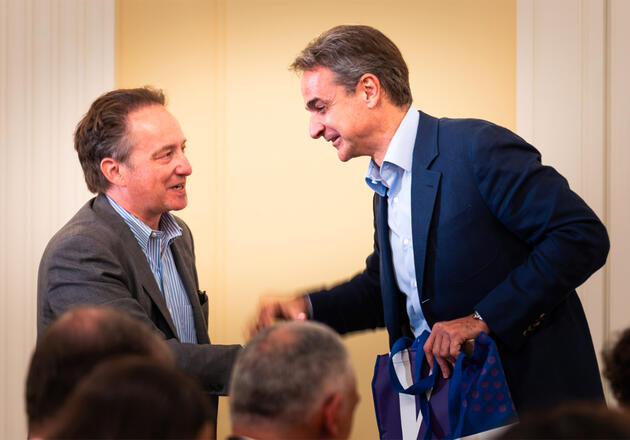
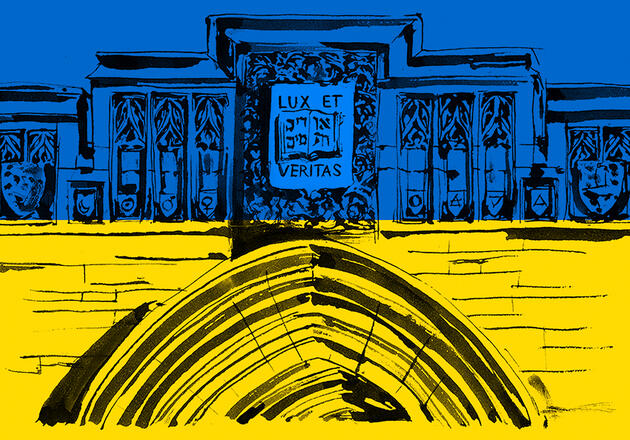
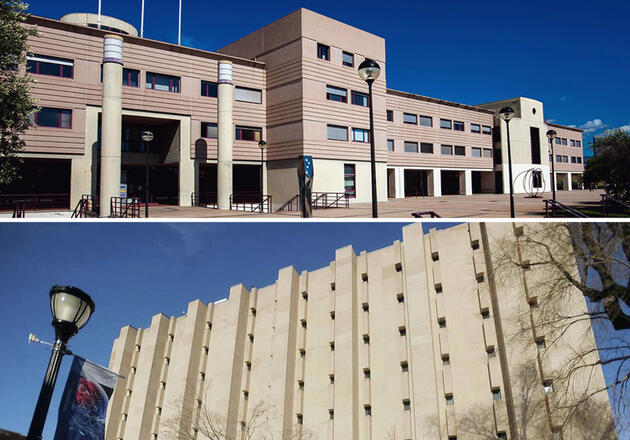
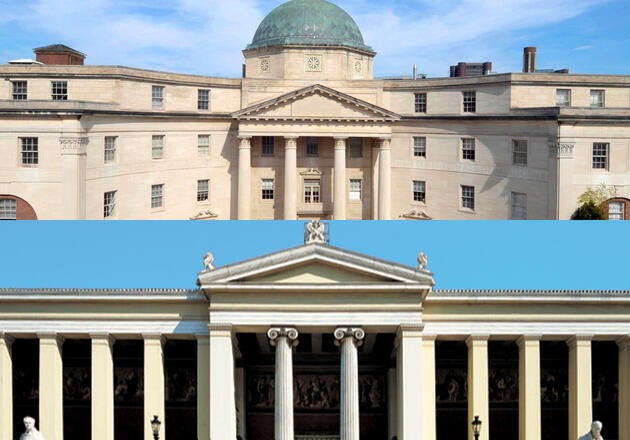
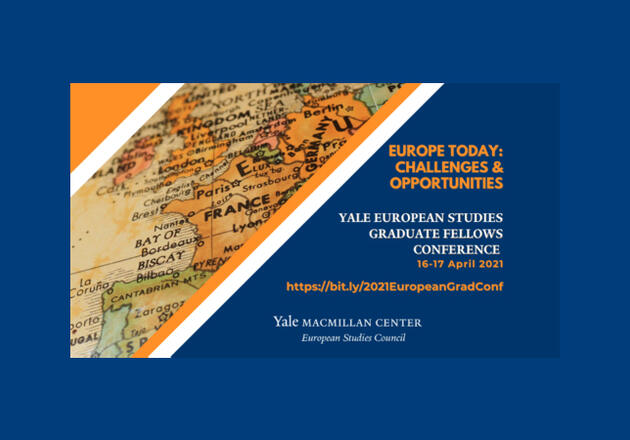
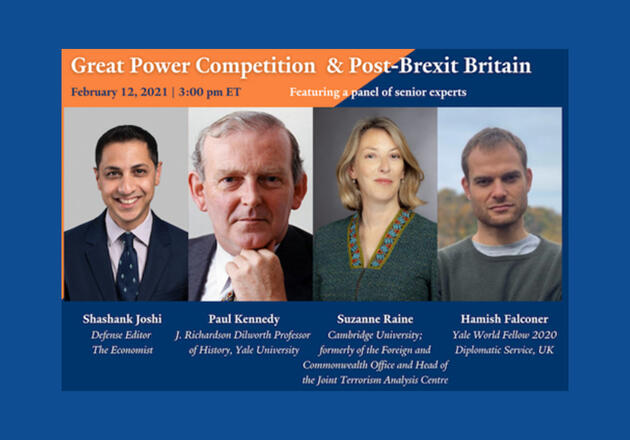
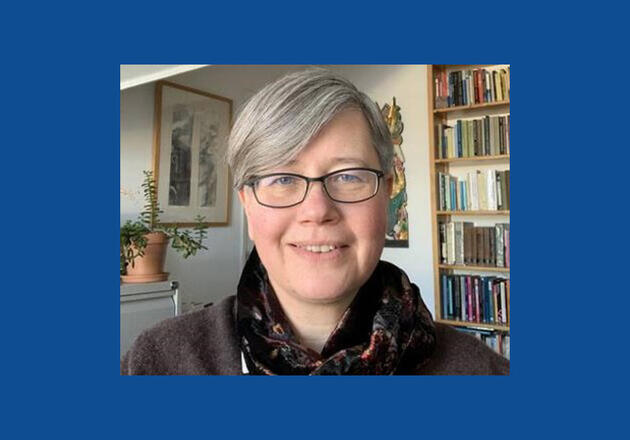

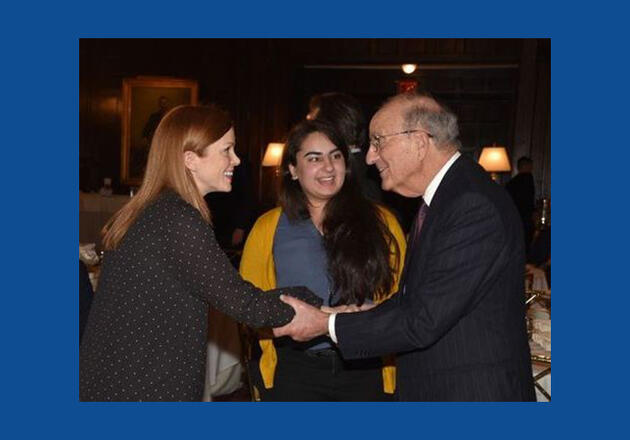


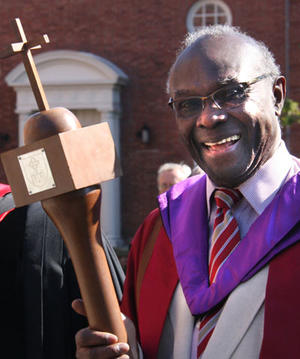
 Salovey attends “The History of Kaunus Soloveitchik Family.” Left to right: Ineta Dabašinskienė, vice rector of Vytautas Magnus University; Salovey; former President of Lithuania Valdas Adamkus; Vytautas Magnus University Rector Juozas Augutis.
Salovey attends “The History of Kaunus Soloveitchik Family.” Left to right: Ineta Dabašinskienė, vice rector of Vytautas Magnus University; Salovey; former President of Lithuania Valdas Adamkus; Vytautas Magnus University Rector Juozas Augutis.